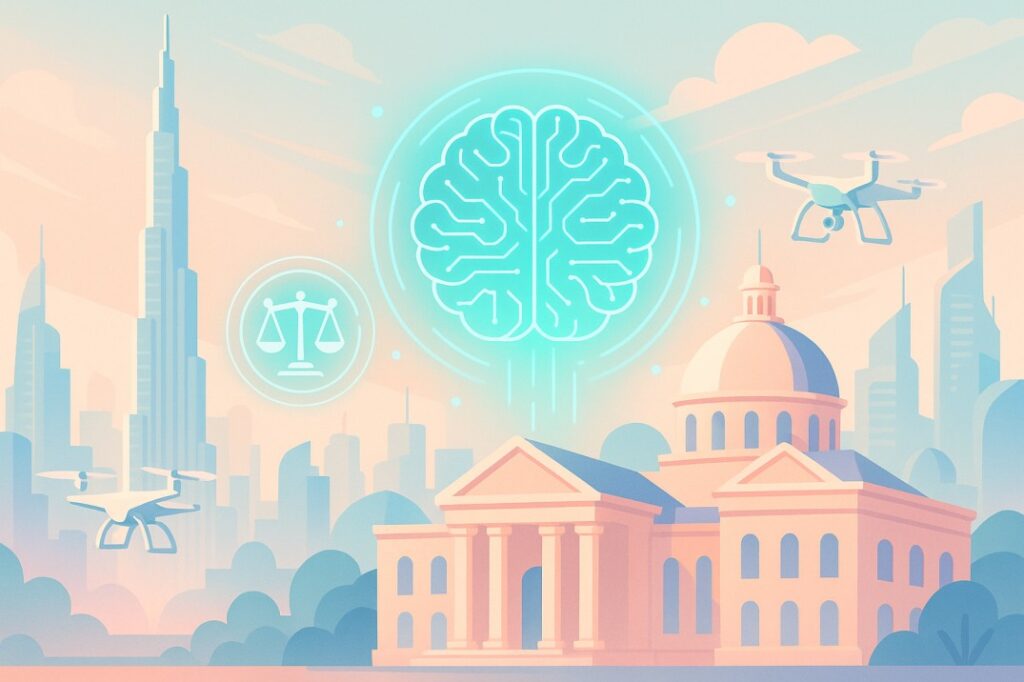Dubai’s AI-Powered Lawmaking Revolution: Is This the Future of Government?
Imagine waking up in a city where laws are drafted in real-time, crafted by algorithms trained on social sentiment, economic data, and legal precedent. Welcome to Dubai in 2025—a city that’s rewriting the rulebook, quite literally, with artificial intelligence at the helm.
🔍 The Origin Story: From Oil Sands to Silicon Circuits
Dubai’s journey is legendary. From a small desert trading outpost, it morphed into a skyscraper-laden economic hub. The story is no longer just about oil or real estate—it’s about innovation, and AI is the new oil.
In early 2025, the UAE government introduced the world’s first AI-powered co-legislator: a deep learning system capable of drafting legal frameworks, analyzing gaps in regulation, and helping lawmakers make data-driven decisions. The Regulatory Intelligence Office (RIO) was born alongside it, ensuring every piece of law has both human and machine DNA.
⚙️ How Does AI Actually Make Laws?
Unlike politicians, AI doesn’t debate or delay. It processes. Here’s how it works:
- Data Collection: Social media trends, economic patterns, crime reports, citizen feedback portals.
- Processing: Algorithms identify societal needs—rising rents, safety gaps, traffic bottlenecks.
- Recommendation: AI suggests legal amendments or frameworks, supported by logical justification and precedent.
- Human Review: Ministers evaluate, debate, adjust, and approve.
Result? The time to enact a new regulation drops from months to weeks—or even days in some cases.
🌆 Why Dubai? The Perfect Sandbox
Dubai’s centralized governance, ambitious leadership, and pro-tech policies create the ideal environment for such experimentation. There’s minimal red tape, and once the leadership commits, execution is swift. AI doesn’t face lobbying or media backlash—it just calculates and proposes.
👩⚖️ Real-World Scenarios: What AI Could Change
Let’s say noise complaints rise in a residential district. The AI system scans complaints, matches them to location, time, and building types, then proposes zoning law adjustments or curfews. Within days, city authorities vote. Residents notice change in a week.
Or imagine new telehealth startups entering the market. The AI predicts conflicts with existing health regulations and suggests regulatory updates before issues arise—saving months of legal wrangling.
🏙️ Citizens, Jobs, and Life in the AI Era
Dubai’s residents—citizens and expats alike—are both excited and cautious. The idea of a smarter government appeals to the tech-savvy youth, entrepreneurs, and digital nomads. But for legal professionals, change is coming fast. Many are now enrolling in hybrid courses combining law and AI at institutions like Zayed University and AUD.
The job market, too, is shifting. Dubai now actively recruits for roles like AI Policy Advisor, Algorithmic Ethics Analyst, and Legal Data Curator. It’s the birth of a new governance economy.
🧠 Ethical Concerns: Can a Machine Understand Justice?
Not all are convinced. Critics question the reliability and fairness of machine-made suggestions. Can AI truly understand cultural nuances, ethical gray zones, or public emotion? Will minorities be represented fairly in datasets? Could a bug in the code turn into a nationwide policy error?
These are real fears. Dubai’s model includes mandatory human oversight, but the question remains: how much power is too much for a machine?
🌐 Global Implications: A Blueprint for the Future?
The world is watching. Singapore, Estonia, and parts of the EU are studying Dubai’s experiment. If it succeeds, we may see AI-legislation models adopted globally. If it fails, it could trigger tighter controls on algorithmic governance.
🧬 A Humanized AI Future
For all its tech, Dubai’s move is deeply human. It’s about creating systems that adapt to people’s needs in real time. AI won’t replace legislators—it’ll augment them, helping them make better decisions, faster.
As Sheikh Mohammed said in the announcement: “We don’t use AI to govern people. We use it to serve them.”
📘 Final Thoughts
Dubai’s AI-powered lawmaking isn’t just a technological leap—it’s a philosophical one. It asks: Can governance be proactive, adaptive, and deeply personal? In Dubai, that answer is yes—and it’s being coded into reality one line at a time.
For the rest of the world, this might just be the beginning of a new chapter: where cities don’t just run, they think.


